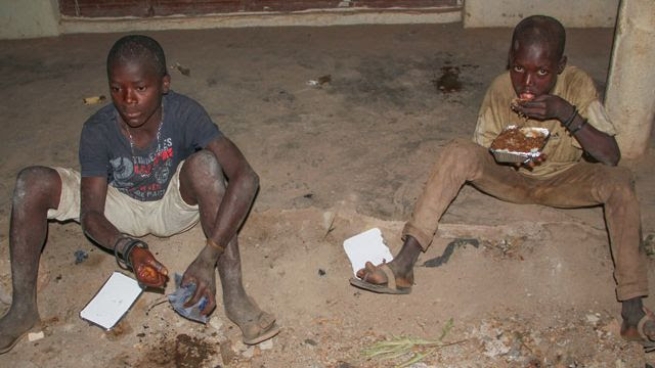The phenomenon of street children is increasing because it is the result of several growing factors: uncontrolled urbanization, poverty, family problems, and lack of opportunities. Many children have no choice, having been abandoned or sent away from their homes due to a lack of food. Others find themselves on the streets because they are orphans, but there are also those who choose to live on the streets to escape the abuse they suffered at home.
Lamin lives in an abandoned car in a garage in Kinshasa (Democratic Republic of Congo); Abdul in a half-sunken boat in the port of Freetown (Sierra Leone); Mauro spends his nights in a market on the streets of Luanda (Angola); Joseph under a bridge in Kampala (Uganda); Jaidev in the train station in Bangalore (India) and Erick survives in a garbage dump in Peru... And so many others of the more than 100 million children spend their days on the streets, surrounded by danger, exposed to violence and abuse, and without the warmth of a family or a home.
For all of them, however, there is a chance to leave the streets, addictions, and crime to survive. Indeed, in most countries where these situations occur, Salesians have programs to take in and reintegrate minors. "It doesn't matter what their past is, only that they are willing to change their lives and become protagonists of their future through education," says the Salesian in charge of one of these programs.
Street children are among those who have suffered most from the consequences of the coronavirus in recent years. They have survived without being able to have a place to shelter, without water for hygiene or masks to avoid infection, and without food or means...
With multidisciplinary teams consisting of social workers, educators, doctors, and psychologists, the Salesians go out to meet these boys and girls to offer them a change of life in a family setting. Sleeping on a bed, having clean clothes, being able to shower, eating three times a day... These are normal gestures, which Salesians provide free of charge to thousands and thousands of minors, in Honduras, Uruguay, Peru, Ecuador, Venezuela, Angola, Tanzania, Kenya, Madagascar, Uganda, Democratic Republic of Congo, Ivory Coast, South Sudan, Sierra Leone, Benin, India...
For all these minors it is difficult to change their lives and accept some rules, but the vast majority end up adapting and learning to live with schedules and rules, along with other boys and girls like them. Eventually, the decision to leave the street behind leads them to another decision: to resume their studies or learn a trade.
Education then becomes the best tool for change. Children overcome past traumas, gain confidence, appreciate acceptance and effort, and set goals for the future. At the same time, Salesian programs, together with the authorities, try to track down their families to achieve family reintegration and offer them a future full of hope and opportunity.


